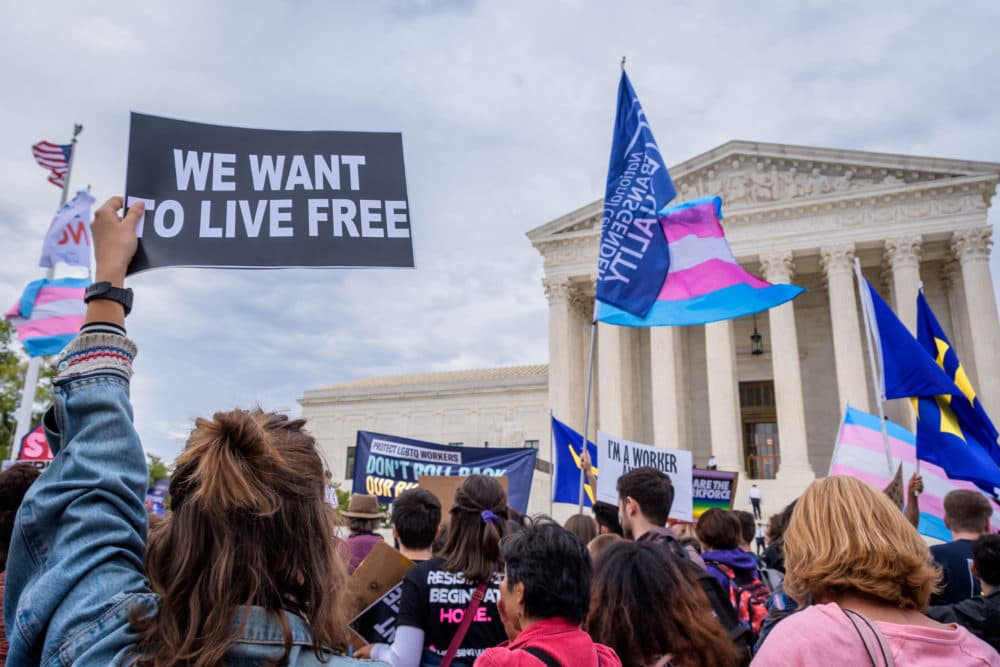Advertisement
In Jamal Greene's 'How Rights Went Wrong,' Reimagining America's Legal Approach To Rights

In the U.S., individual rights are sacrosanct. Legal scholar Jamal Greene calls that "rightsism," and says it's pushing the country in the wrong direction. We hear why he says it’s time to reduce the focus on individual rights.
Guests
Jamal Greene, constitutional law professor at Columbia University. His new book is "How Rights Went Wrong." (@jamalgreene)
Jack Beatty, On Point news analyst. (@JackBeattyNPR)
Also Featured
Chase Strangio, deputy director for transgender justice at the ACLU’s LGBT & HIV Project. (@chasestrangio)
Interview Highlights
On ‘rightsism’ in America
Jamal Greene: “What rights fetishization or rightsism refers to in the book is the tendency to think that disputes about rights are all about figuring out who has the right, and who doesn't have the right. And when you figure out who has the right, that person is basically supposed to win. And the person who doesn't have the right is basically supposed to lose. And so the dispute is just about figuring out which side the Constitution prefers. And which side the Constitution ignores or doesn't prefer.
“And we arrive at that place on the view that rights are supposed to be absolute, or close to absolute. Maybe you can violate them in an emergency, but they're basically supposed to be absolute. So someone has to win, and someone has to lose. And that requires an assignment of rights to one side or the other. And that's destructive in any number of ways that I outline in the book, including divorcing rights talk from our intuitions about justice. Because justice often lies somewhere in the middle between awarding rights entirely to one side, and not to another.”
On a history of individual rights
Jamal Greene: “There is something deeply felt about rights. But I'll say a couple of things. One is that, of course, rights can't be absolute and existential for everyone. Because we're all different from each other. We have different commitments and values and they come into conflict. And so rights that are in conflict with one another can't both be absolute and existential.
“But this view, which we do, I think, associate with Americanness and often tied to the founding, is relatively new. And I date it in the book to roughly the 1960s, when courts, and also politicians and people outside of courts are responding to a bunch of kind of very new rights claims in the 1960s around the sexual revolution, around the women's rights movement, around criminal procedure, lots of new free speech rights. And we sort of [were] deluged by this avalanche of rights claims. Courts get a lot of anxiety about them, and decide that they have to pick and choose which rights count, and which rights don't. And I think that's where the path that we're on now basically starts.
“The founders took rights very seriously. And so the idea that rights are really important does date back to the founders. But the founders did not think about rights in this quasi absolute sense. And they certainly didn't think about rights as something that judges are supposed to decide for us. They thought about rights in very much political terms as something that political communities are devised in order to protect. And we've really gotten away from that vision.”
Advertisement
Why a focus on individual rights can be a barrier to justice
Jamal Greene: “There's a couple of ways in which the court, as you say, slams its door on recognition of structural inequality. One is that it never recognizes it directly. And there's a series of cases in the 1970s involving so-called disparate impact. So when there's a claim of discrimination that is not specifically intentional, but there's a differential impact on people of a certain race, the court doesn't recognize those claims at all. There's also an important case in the ‘70s around schooling, a number of important cases around schooling.
“But there's one in particular about whether kids in poor neighborhoods have a right to equal funding with kids in rich neighborhoods, even in the same school district. The court says no. And race and structural inequality is very much bound up with that case. The other way is even when the state tries to recognize structural inequality in various ways, the court kind of shuts its door to that. And the affirmative action cases are a good example of that, where the reason why lots of institutions pursue race-based affirmative action is to combat structural inequality.
“But the courts don't even recognize that as as a valid reason. The reasons why are complicated, they're political, they're ideological. But one of the really important obstacles to recognizing structural inequality is that if you think about rights as being absolute, it's going to be really hard to say, You've got an absolute right to never face structural inequality. Because that's going to require courts to really change society in ways they're not comfortable with.”
On whether it’s possible to reform society’s view of rights
Jamal Greene: “If courts approach rights conflicts as if compromise is not necessary, then that affects politics. So if courts were to say, We're not going to give you everything you want. Then that affects the amount of leverage people have in political conversation. It affects what people ask for from courts. So these things are related to each other. I'm certainly not utopian, right, so I don't think that the political system is what people want from it. [It] has lots of problems. But I also think it's important to recognize that when I say politics, I don't just mean Congress. I don't just mean a state legislature.
“There are lots of sites of politics. In fact, we're having one right now. So conversations that happen within the media, conversations that happen in a youth sports, league conversations that happen in people's living rooms, and in their places of worship and in their civic organizations. These are all places in which the political culture is formed. That's where we work out what our norms are. And those that inform our political choices, and what the political universe looks like. And if we think courts are the place to do that, then that's going to be hollowed out. And that's not a very healthy society.”
Book Excerpt
Excerpt from How Rights Went Wrong: Why Our Obsession with Rights Is Tearing America Apart by Jamal Greene. Copyright © 2021 by Jamal Greene. Available now from Mariner Books. Reprinted by permission of the publisher.
From The Reading List
New Yorker: "From Guns to Gay Marriage, How Did Rights Take Over Politics?" — "'You came through for me, and I am going to come through for you,' Donald Trump said. It was 2017, and he was in Atlanta, speaking at a meeting of the National Rifle Association—the first time in more than thirty years that a sitting President had addressed the group."
Washington Post: "Book review of How Rights Went Wrong: Why Our Obsession with Rights Is Tearing America Apart by Jamal Greene" — "Americans feel strongly about their rights. In September, Rocco Sapienza, 80, was fatally assaulted after confronting a fellow patron in a New York bar who was exercising his 'right' to go maskless. Sapienza is not alone in dying over a supposed right."
The Atlantic: "America’s Legalistic Culture Is About to Become a Problem" — "As vaccine production and distribution accelerate, a new set of challenges around what Americans can and should demand of one another is emerging. And we’re not ready for them."
This program aired on June 16, 2021.

